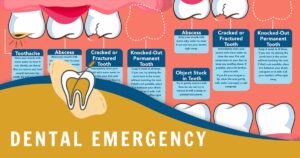What is dental emergency?

A Dental emergency is any situation involving the teeth, gums or oral structures that requires immediate attention from a dental professional to reduce severe pain. Prevent further damage, or address a serious health risk.
Quick tips for handling different types of dental emergencies!
-
Severe Toothache
First, thoroughly rinse your mouth with warm water to clean it out. Use a dental floss to remove any trapped food particles. Apply a cold compress on the outside of your cheek to reduce swelling and take an over-the-counter pain relievers such as ibuprofen, acetaminophen, and never place an aspirin directly on your tooth or gums because it may burn your gum tissue. Consult your dentist for this as soon as possible
-
Knocked-out Tooth
Handle carefully and pick up the tooth by the crown (the top part that is visible). above your gums). And gently rinse the tooth with water , do not scrub it or remove any attached tissue fragments. If possible, Try to reinsert the tooth into your socket and hold it in place. Place a tooth in a container if you cannot reinsert it A product containing milk or cell growth medium, such as Save-A-Tooth. in all In the above cases, consult a dentist immediately. If you get treatment within an hour, the chances of saving the tooth are high
-
Lost filling or crown
Sometimes, old dental restorations fall out. If you have one, A piece of sugarless gum should be pasted into the cavity (sugar-filled gum pain) or use over-the-counter dental cement. Contact immediately Dentist as soon as possible. If your dental crown or bridge broken, make an appointment to your dentist as soon as possible. avoid chewing on the affected side until you see your dentist.
-
Chipped or broken tooth
You should save the piece of tooth you find and rinse your mouth with warm water. If there is any bleeding from that area, place cotton gauze on that area for
about 10 minutes until the bleeding stops. Apply a cold compress outside of the affected area to reduce any swelling. Contact your dentist for an emergency appointment.
-
Broken braces and wires
If a wire is poking your cheeks or gums, use a small piece of orthodontic wax or a cotton ball to cover the end. Do not cut the cord, as you may accidentally swallow it That’s it. Contact your orthodontist immediately.
-
Dental Abscess
A Dental is a localized collection of pus caused by bacterial infection in teeth, gums, or surrounding tissues, which may lead to severe pain and swelling of the affected area. Rinse your mouth with a mild salt water solution several times a day to reduce pain and draw out the infection. dental abscess is a serious condition If left untreated, it may cause swelling in your face or jaw, or it can spread to other parts of the body. If you have a dental abscess, you should see your dentist as soon as possible. as possible.
-
Soft tissue injuries
If any injury occurs to your soft tissues, including gums, tongue, and cheeks, To control bleeding, you need to rinse your mouth with mild salt water solution and apply a moistened piece of gauze to the bleeding area for 15- 20 min. still if bleeding continues, see your dentist immediately or go to a hospital emergency room. Being prepared and knowing what to do in a dental emergency can help minimize ensure the best possible outcome for oral health.
At solitaire family Dentistry, we provide exceptional emergency dental care. Contact us today to schedule your appointment.


